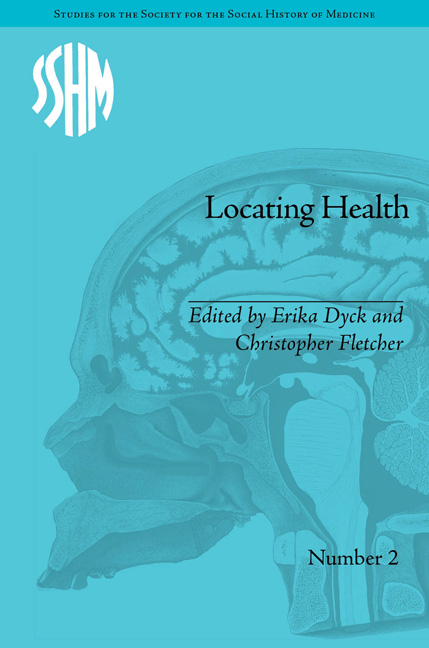Book contents
- Frontmatter
- CONTENTS
- List of Tables
- List of Contributors
- Acknowledgements and Preface
- Introduction: Healthscapes: Health and Place among and between Disciplines
- 1 Placing Maternal Health in India
- 2 Putting Medicine in its Place: The Importance of Historical Geography to the History of Health Care
- 3 Finding Place in The Big-Little World of Doc Pritham: Telling Medical Tales about Northwoods Maine, 1920s–70s
- 4 Putting Hyperactivity in its Place: Cold War Politics, the Brain Race and the Origins of Hyperactivity in the United States, 1957–68
- 5 Why Canada Has a Universal Medical Insurance Programme and the United States Does Not: Accounting for Historical Differences in American and Canadian Social Policies
- 6 Alberta Advantage: A Canadian Proving Ground for American Medical Research on Mustard Gas and Polio in the 1940s and 50s
- 7 Placing Illness in its Cultural Territory in Veracruz, Nicaragua
- 8 Chronic Disease in the Yukon River Basin, 1890–1960
- 9 An Ideal Home for the Consumptive: Place, Race and Tuberculosis in the Canadian West
- 10 Serbian Landscapes of Dreamtime and Healing: Clear Streams, Stones of Prophesy, St Sava's Ribs, and the Wooden City of Oz
- Notes
- Index
5 - Why Canada Has a Universal Medical Insurance Programme and the United States Does Not: Accounting for Historical Differences in American and Canadian Social Policies
- Frontmatter
- CONTENTS
- List of Tables
- List of Contributors
- Acknowledgements and Preface
- Introduction: Healthscapes: Health and Place among and between Disciplines
- 1 Placing Maternal Health in India
- 2 Putting Medicine in its Place: The Importance of Historical Geography to the History of Health Care
- 3 Finding Place in The Big-Little World of Doc Pritham: Telling Medical Tales about Northwoods Maine, 1920s–70s
- 4 Putting Hyperactivity in its Place: Cold War Politics, the Brain Race and the Origins of Hyperactivity in the United States, 1957–68
- 5 Why Canada Has a Universal Medical Insurance Programme and the United States Does Not: Accounting for Historical Differences in American and Canadian Social Policies
- 6 Alberta Advantage: A Canadian Proving Ground for American Medical Research on Mustard Gas and Polio in the 1940s and 50s
- 7 Placing Illness in its Cultural Territory in Veracruz, Nicaragua
- 8 Chronic Disease in the Yukon River Basin, 1890–1960
- 9 An Ideal Home for the Consumptive: Place, Race and Tuberculosis in the Canadian West
- 10 Serbian Landscapes of Dreamtime and Healing: Clear Streams, Stones of Prophesy, St Sava's Ribs, and the Wooden City of Oz
- Notes
- Index
Summary
Why does Canada have universal medical insurance while the United States has a mixture of private and public programmes that leaves 70 million Americans without insurance for at least part of the year? More generally, why is Canada's welfare state more advanced than its American counterpart? According to Seymour Martin Lipset, Americans are heirs to a revolution that embodied individualist values. Canadians, heirs to the North Americans who stayed within the British fold, developed a more ‘toryish’ or organic approach to society, an approach that eventually allowed socialism to emerge as an important, if minority, ideology. While socialism became a ‘foreign’ ideology to Americans, it gained respectability in Canada. ‘Red Tories’ became the backbone of a social consensus in Canada decidedly left of its American counterpart.
The historical record contradicts Lipset's theory. As late as 1960, the American welfare state trumped its Canadian counterpart. Progressive social interventionism in Canada is a recent phenomenon for which events in the 1770s provide little explanation. This chapter argues that Lipset confuses cause and effect regarding social policy variances between the two countries. He provides little evidence that Canadians favoured social intervention more than Americans in the period before their major social programmes were implemented. He merely establishes that today's Canadians support their country's social programmes while Americans seem happy enough with the limited social welfare state that characterizes their country.
- Type
- Chapter
- Information
- Locating HealthHistorical and Anthropological Investigations of Place and Health, pp. 71 - 88Publisher: Pickering & ChattoFirst published in: 2014



